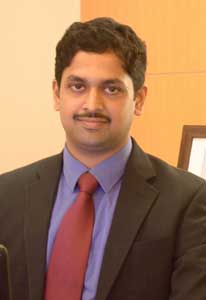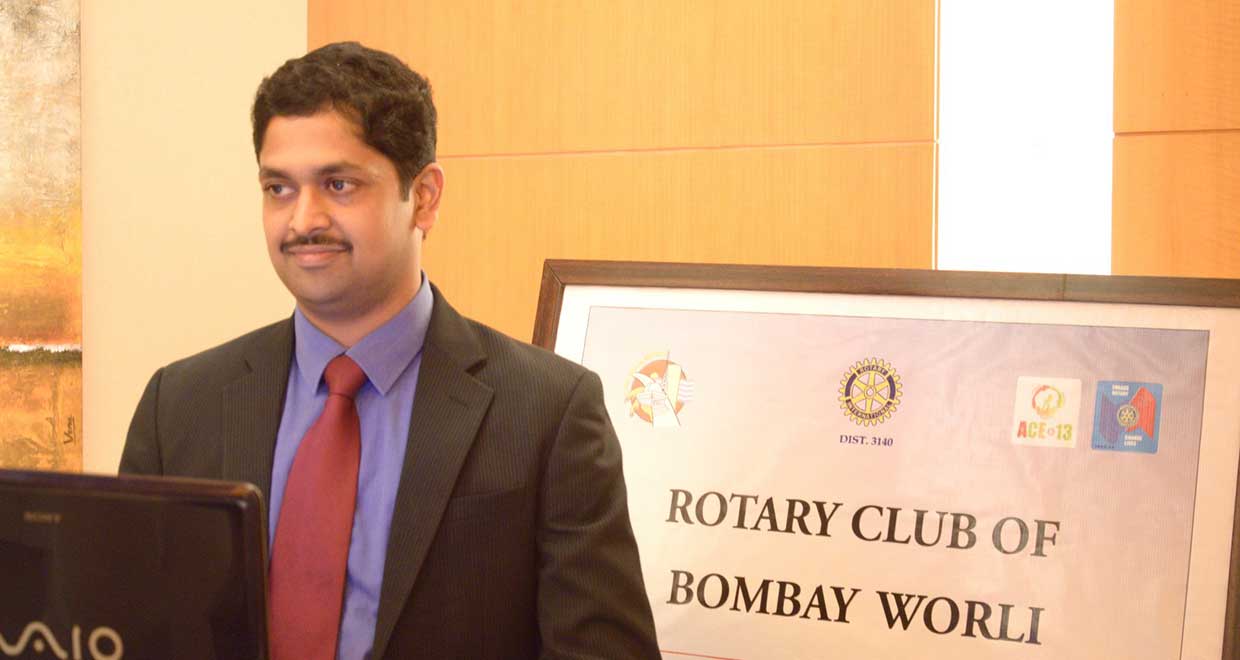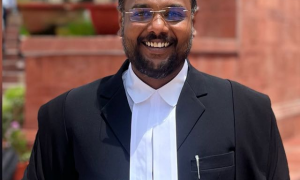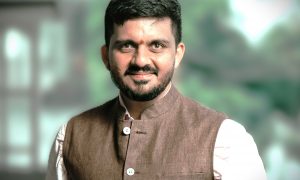 Yuvraj Narvankar graduated from ILS, Pune in 2010. He has already set up a reputed practice at the Bombay High Court. His expertise in Cyber Law and Cyber Forensics has led the Mumbai Police to consult him in various matters from time to time.
Yuvraj Narvankar graduated from ILS, Pune in 2010. He has already set up a reputed practice at the Bombay High Court. His expertise in Cyber Law and Cyber Forensics has led the Mumbai Police to consult him in various matters from time to time.
In this interview we speak to him about:
- The role of a mentor in the first few years of graduation,
- Importance of grades
- Working on important cases
Tell us about how you decided to study law.
My father is an advocate practising in District Court. It was possibly those interesting discussions in my home about court life and clients which made me choose this profession.
I was always fascinated by people who have the gift of the gab and I always thought of this profession as noble and very influential. I always liked to speak and convince people on some topic and my participation and accolades in several elocution and debating competitions were out of my desire to talk to people than any urge to win.
The fascinating thing which I liked most about the law was its nature. I always felt that law is not alien to our life but every part of it is a law. Law is nothing but a codified common sense. If you think that something should be this way and if your logic is correct, you would inevitably find law or case-law to that effect. So the power of thinking on your own legs is something which makes this faculty most interesting field to study and explore.
Have you even been motivated by the desire to revolutionize the legal regime in the country?
I was very active in the field of Legal Aid and was given an award for my contribution in Legal Aid. When I interacted with people from rural areas, I realized the gross ignorance of laws and exploitation of this very ignorance by a few prominent people. And when I entered the profession, fortunately, I was able to espouse several social causes and they also turned out to be milestones in my career.
What are the tips and strategies you would like to share with our readers who are currently law students?
(Yuvraj has been among the top rankers in LL.B from Pune University and LL.M from University of Mumbai.)
For me every subject of law was interesting. In my college days, I was fascinated by books by Lord Denning and writings of other authors like Bryan Garner, Blackstone. It’s interesting to study the genesis of concepts which have shaped legal regimes over centuries. I always wondered about the sophistication of faculty of law in the countries like UK and USA. Just for example for us drafting is all about the precedents and forms but that that is a craft in itself and has to be treated like one. Even oral submission and persuasion are amazing arts and can’t be left to be learnt at an advanced stage of your career. In fact law college is such a platform where you can test all your skills without fear of any professional blunder or injuring your clients’ interests. It’s like the more you sweat in the practice, less you will bleed in the war. I think the best strategy or tip to study law is to study it out of interest and not because it’s in your syllabus. For example, if you are reading a section, put yourself in the role of the client who would be in the trouble which the section seeks to redress and then read the Section again. The section in statute/Article is like key and the problem/case is like a lock. The problem with our educational system is that we are taught to use the key without lock and when you have to actually open the lock (A case in your professional life) you would have forgotten about the key.
So the best way out is to apply every section practically or look for a situation in your life where you can apply any proposition of law you have learnt. This way you would imbibe law in your thinking and law would be no more in black and white but would be a an amazing colourful spectrum and a panacea for all your problems.
And I firmly believe that any rank and Gold Medal is a mere by-product of your studies. It may follow or it may not but the actual capital you gain is your habit of hard working, knowledge and thinking process. The knowledge of law does not mean knowing a law by heart but to know how to interpret the law.
Do you think top notch grades have given you an advantage over others in your arena of litigation?
Possibly. As Steve Jobs says, it’s all about connecting the dots. Today standing in a court of law while arguing a matter, no one bothers about my rank or medal. But to get here I had to find some mentor, and the ranks helped me to get good mentor and seniors. So it won’t be wrong to say that the ranks did help me to get along with the right persons and at the right time which paved my way to a career in litigation. Because, though unfortunate, rank or marks is the symbol of your capability which can testify about your capacity to some stranger. And once you get a good launch pad, your performance will speak for itself and you have to put your medals and certificates in the cold storage. Gold medal, certificate, or law degree is like a driving license which allows you to drive the Car. Once you get behind the wheel, its your performance that matters and gets you to the destination and not your License. Because when you drive a car, what helps you is the knowledge you gained for obtaining the license and not the license.
How difficult would you say the first few years after graduation was for you?
The first few years after graduation are really tough and I won’t describe them as we all know about them. Particularly the starters in litigation know this feeling. In fact, since I always aspired to work in Litigation, I didn’t go for campus placement as I was looking for some hands-on experience in litigation. After my graduation I could make it in one Litigation Firm so I could sustain in Mumbai. This was the time when I did all kinds of matters and appeared extensively in all forums. In fact, all the senior members of the Bar are your mentors and teach you something. Even some Judges teach you law very well. The Court Room is the best class room a law student can get but unfortunately he gets it after he graduates.
After my stint in the law firm, I took a bold decision of resigning and joined the chambers of Mr. Rafique Dada, former Addnl. Solicitor General of India. It’s only after you move out of your comfort zone and take a plunge into uncertainty that you can achieve something. You must have the guts to move out when you know the ‘cheese’ is turning ‘stale’ though the journey to the unknown is scary.
It’s because you have to manage without any fixed source of income and what is more deadly is to be without any work. I could learn a great deal of court craft with my senior who is one of the living legends of Bombay Bar.
My bolder decision came when I decided to even leave his chamber and start on my own without having any place to operate and firm client base. But I always had strong sense of urgency and strong urge to see this world of Litigation without any shelter of firm or senior over my head. Soon I found myself struggling with all odds.
But I always kept moving ahead somehow and it would not be fair to boast that all my efforts were directed to achieve some goal or aim. Frankly speaking those were only efforts and one must keep walking and one day he would be able to connect the dots. So it would be unfair to other possible modes of walking if I illustrate mine. Only one thing is at the core and that is faith in yourself and in your capability.
Can you tell us about the law diploma you pursued from NUJS offered by iPleaders?
Yes. I have taken up several courses like Cyber Law, Housing Law, etc and the latest one being business law course from NUJS. Firstly, any course keeps your learning faculty agile which may otherwise die because soon we get the feeling of contentment. What I liked about the course of business law from NUJS is the curriculum and practical approach of the faculty. I found all the faculty very knowledgeable and very pro active. In fact iPleaders should go ahead and try to make this course part of curriculum in colleges which would benefit students who aspire to become a litigator or a law firm lawyer.
How difficult would you say it is for a fresh law graduate to get inducted into a litigation firm?
Yes. It is a challenge for someone like me who doesn’t opt for campus placement because PPOs can make things a lot easier. If you start early and prove your mettle, the law firms would certainly welcome you. Your rank and merit also goes a long way in securing a good position in a law firm. If your basics are good, nothing can stop you.
The one who wants to make it in litigation, must make it a point to work in a trial court, howsoever uncomfortable it seems at the outset. Because, that is the first step of ladder and it gives you an edge over others when you argue in High Court and Supreme Court.
How helpful has been mooting in litigation?
Tremendously helpful. Moot Court is like training on simulator. You learn without any casualty. I did several national and state level moots and I really learnt a lot from them. Only make it a point to learn from every moot. No academic/moot performance should be the same as the previous one. It’s a race with yourself and not with anyone else. And you have to come out of this ‘illusion of competition’. I think one must focus on making oneself better every day and small daily professional improvements will pile up and take one to the Zenith.
How did your first hearing as an independent practitioner go?
First thing which I would like to share is about the cases a junior gets to handle. One must remember that you can’t get open and shut cases in the beginning and rather you would get hopeless cases to argue and the briefs which others have said no to. But make it a point to sweat on the small stuff and get into details and try to make something out of those cases. It may seem very hard at first,but once you are master of these ‘messy causes’, you would enjoy working on good briefs.
For an arguing lawyer every case is close to his heart but to mention a few:
To begin, within a month of joining the Bar, I had an opportunity to argue a very interesting case on a preliminary issue of Jurisdiction (S.9A of CPC) against one giant at the Bar. It was a very interesting case to argue as there was one Apex Court Judgment against us and issue was narrow and no more res integra. But after hearing me for a whole day, the court dismissed the opponents’ application for framing preliminary issue. To my interest, this was the case which reaffirmed my faith that law is all about your own thinking and you can turn the case if you think a little outside the box and genuinely convey your emotions to the judge without hurting the ego of the senior advocate for the opponent.
In fact this case in the first week itself, gave tremendous boost to my confidence and went a long way in shaping my career.
Later, I appeared in the much spoken about Air India employees case on behalf of the Cabin Crew members and it was a great learning experience.
When I was working with my senior, I had an occasion to work on BCCI/IPL matter, Coal scam matter and Goa mining case in Supreme Court.
Then, I had an occasion to conduct some good criminal trials and conducted cross examinations of the witnesses leading to acquittals of my clients. The well conducted cross examination is sheer joy and great learning experience and gives insight into human mind and interplay of emotions.
Then, I had an interesting case of bogus multiple Development Rights Certificates (TDRs) obtained on the same piece of land and the same was done very cleverly by the concerned revenue officers in connivance with developers. As most of the TDR/DRCs were sold in the open market and already purchased and consumed by the builders, several Senior Counsels were roped in to defend the case. I had to study a truckload of documents to exactly know, where the things went wrong and put in equal amount of efforts to convince the High Court about it, as the High Court is never willing to go into factual details in Writ Jurisdiction.
Finally, I succeeded and irrespective of huge financial stakes, the High Court set aside all the TDRs/DRCs. This case received very wide media coverage and acted as deterrent to Land Mafias.
The next interesting matter I argued was of ‘Collection of Toll’ issue in Western Maharashtra. In fact, this issue was very sensitive due to widespread opposition and local violence. As the project was on the verge of completion and the builder had already invested thousands of crores of rupees there was tremendous opposition in the Court of law and the courts were very reluctant to give any interim relief as this was a financial matter. Due to vital constitutional issues, even Advocate General of Maharashtra was issued notice and he appeared and argued extensively. I had to give all my devotion to this case to understand several technical and financial intricacies of PPP. I argued the matter for three consecutive days and the counsels for respondents also took equal time to respond.
Finally the Judgment was in my favour and first time the unconditional stay was given to the collection of Toll.
I also represented the students of engineering where we challenged the vires of the one arbitrary provision of the regulations framed under the parent legislation and finally succeeded to the big relief for the students.
Recently, I appeared in the illegal hoarding matters wherein substantive directions were issued by the High Court, on the lines of Vishakha Judgment, for immediate removal of the illegal hoardings and political banners in Maharashtra and Goa.
One interesting criminal case I argued was on the illegal detention of the person where after taking the court through the historical meaning of the term custody and concepts related thereto, I could drive home my point and succeed.
Recently four of my judgements were reported in Arbitration Law, Port Trust laws and Civil procedure law wherein some trend setting judgments were passed by the High Court.
What is your workday like?
When you are working in a firm the chances are great that work may fall in predictable pattern. But if you pursue an independent practice, every moment is new and challenging. My day begins at around 8 a.m. and my office remains open till 11/11.30 p.m. Unlike a firm, you have to set your own deadlines and it’s entirely upto you to have your work-life balance. Fortunately my staff is competent and the same is very necessary to operate an independent law office.
The day in court is always full of challenges and you never know what may come from the bench and also from the Counsel appearing against you. Full preparation and mastery over facts is the best assistant you can ever have in the Court; rest of the things fall in place. This is the world of ‘No-Excuses’.
What prompted you to leave a firm and start independent practice?
I would say it was my own gut feeling which prompted me to leave a firm and the same turned out to be the big decision for me. Today when anyone comes to me to join my office, my advice is to learn the basics of drafting and pleading from a litigation firm because unfortunately, though seniors in Bar are very competent, tremendous workload makes it impossible for them to take some time out and teach the junior. Whereas in the Firm you are made to work and you realize the importance of Discipline. Sometimes to maintain a proper file may matter more than arguing the matter.
But working with an independent practitioner has its own advantages and if you can keep your eyes open, that is the most fertile ground to learn and excel. Start appearing as early as possible.
And finally you can’t swim by watching others swimming so get into the water, although it may seem rough.
How is your experience presenting lectures on subjects like Cyber Law and Cyber Forensics?
(The Mumbai Police Dept. consults Yuvraj on Cyber Law issues from time to time.)
Yes. I have delivered several lectures across Maharashtra in Bar Associations, Rotary Clubs etc. My subjects vary from Cyber Laws, Succession among Muslim laws, Euthanasia etc. I have completed my advanced course in Cyber laws and Forensics with 1st rank. I have represented the police department in several matters involving cyber law issues and forensic investigation. In one of the recent cases, the accused was refusing to cooperate and refused to give access to his laptops and approached High Court espousing his right of privacy. We contested the case on merits and we succeeded. Maybe it’s the faith you gain in course of time which makes people come to you and entrust their cases.
Many notable jurists have stated that it is important to know the judge more than the case. How much truth do you find in this?
So true, but not more than your case. You have to read the Judge and give what he wants and not what you want to give. Don’t suppress anything and be absolutely fair to the Judge.
I would go a step further. You have to know every person you are dealing with and should be able to express yourself accordingly. At one moment you may be talking to some Law Firms’ partner you are briefed by and the next moment you may find yourself advising a client from distant rural area. You must be able to connect with and adapt yourself to the person you are dealing with.
How difficult would you say it is to build a reputed practice?
It depends on what kind of matters you have argued and how much you are known within and outside your circle. Fortunately, I had an occasion to argue some good matters which went a long way and also got me firm clientele. Hard work is something I would not comment on as it is something which is not some special quality for a lawyer but has to be a part of his nature.
What would be your parting message to law students who want to litigate just after graduation?
Keep your eyes open and you will see abundant opportunities floating around you. Work hard and read beyond the books as a lawyer cannot sit in an ivory tower and operate. Litigation is fun and a way of life. Focus on your strengths and work on your weaknesses and excel. You must not restrict yourself and build walls around you. Only one word of caution, in the early days of success, many unscrupulous people (Which are many in this profession) may try to use your knowledge or expertise to get something which is unfair or unethical etc. So a junior lawyer must have the guts to say no to such briefs and be always loyal to the court and dignity of this noble profession. Delayed success is always better than the tainted one.
Best of luck !


























